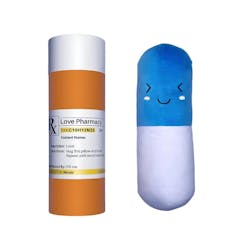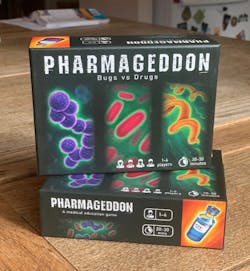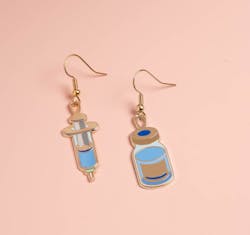The holidays can be a stressful time of year, so to help you celebrate the season, our Pharma Manufacturing team has compiled a list of the perfect gifts for the pharma professional in your life.
We compiled a similar list in 2019, and this year, it’s back, packed full of entertaining gift ideas (and we may have snuck in some pharma content as well).
So struggle no more with your holiday shopping — and maybe find something to treat yourself with too.
Pharma plush pillows
Like a comforting pillow, oral solid dose formulations are familiar and trusted by patients. Designed to be swallowed and dissolved in the gastrointestinal tract, tablets, capsules and softgels serve as the primary means of drug administration for approximately 84% of all medications.
While OSD has earned its place as the industry’s most reliable drug delivery tool, manufacturers continue to look for new ways to help it soar. Recent technological advancements have ushered in an era of renewal for OSDs, offering fresh possibilities to enhance the dosage’s efficacy and improve the patient experience.
Read more about this in our recent cover story, OSD soars.
Pharmageddon card game
While card games are fun, increasing our knowledge about antibiotics is more imperative than ever before. Each year, more than 1.2 million people worldwide die from antibiotic-resistant infections. If no action is taken, it’s estimated this number will grow to 10 million per year by 2050.
This past May, senators Michael Bennet and Todd Young and representatives Drew Ferguson and Scott Peters reintroduced a key piece of legislation — the Pioneering Antimicrobial Subscriptions to End Upsurging Resistance (PASTEUR) Act — in Congress. If finally passed, the law would change the way the U.S. government pays for critically needed antimicrobials, basing it on value to public health, not sales volume.
The pharma industry made some headway in antibiotic approvals this year:
In March, the FDA approved Cidara Therapeutics and Melinta Therapeutics’ Rezzayo for the treatment of candidemia and invasive candidiasis in adults with limited or no alternative treatment options. Rezzayo is the first new treatment option approved for patients with infection caused by yeast in over a decade.
In April, GSK presented positive results from two pivotal phase 3 trials for gepotidacin, an investigational antibiotic for uncomplicated urinary tract infections — bringing the drugmaker a step closer to having the first in a new class of oral antibiotics for the indication in over 20 years.
In May, the FDA approved Innoviva's intravenous antibiotic for the treatment of hospital-acquired bacterial pneumonia and ventilator-associated bacterial pneumonia, offering new hope for critically ill patients who have limited treatment options.
In November, Innoviva's oral antibiotic, zoliflodacin, met its primary endpoint in the largest pivotal phase 3 trial to date of a potential first-in-class treatment for gonorrhea.
DNA cookie cutters
Everyone loves a cookie, but sometimes DNA isn’t always sweet…Residual host cell DNA is an insidious contaminant that can cancel out the therapeutic benefit of some cell and gene therapy treatments.
A common form of this contamination is residual DNA from human embryonic kidney-derived epithelial (HEK293) cells, which can render a treatment unsafe for patients.
HEK293 cells are one of the most used cell lines in CGT manufacturing, so improving detection methods to eliminate and prevent host cell contamination is critical to the success of these therapies moving forward.
Read more about screening for residual DNA contamination here.
If you prefer your DNA cuddly instead of sweet, we’ve got you covered there too.
Injectable-themed jewelry
Are you a fan of sterile injectables? Display your love with some syringe and vial earrings or some syringe cufflinks.
This past year, the pharma market has shared your enthusiasm.
2023 brought several victories in the RSV preventative space. This past May, the FDA approved GSK’s Arexvy for use in individuals aged 60 and older. A month later, the agency approved Pfizer’s bivalent RSV vaccine, Abrysvo, for the same patient population. Abrysvo was later approved for use in pregnant individuals.
In July, AstraZeneca and Sanofi’s single-dose long-acting monoclonal antibody, branded Beyfortus, became the first U.S. approved RSV preventive option for a broad infant population.
Self-administered injectables are also a hot area. It’s estimated that by 2024, the global market for self-administered injectable drug delivery is expected to exceed more than $119 billion.
Included in this group is pharma’s newest goldmine — incretin-based diabetes and obesity treatments.
In November, the FDA approved Eli Lilly's tirzepatide injection, branded Zepbound, for chronic weight management in adults with obesity or overweight, adding another option to a surging market dominated by Novo Nordisk.
Merry CRISP-mas
The pharma industry experienced a watershed moment when the U.K.’s MHRA granted the first regulatory authorization of a CRISPR-based gene-editing therapy in the world this past November to Vertex Pharmaceuticals and CRISPR Therapeutics.
And with that, CRISPR has officially gone mainstream with clever mugs, t-shirts and even a nod on Saturday Night Live.
Casgevy is designed to work by editing the faulty gene in a patient’s bone marrow stem cells so that the body produces functioning hemoglobin. This is accomplished by taking stem cells from the patient’s bone marrow, editing them using CRISPR and then infusing them back into the patient.
Casgevy uses the gene-editing tool which earned its two developers, Emmanuelle Charpentier and Jennifer A. Doudna, the Nobel Prize in Chemistry 2020. According to the Royal Swedish Academy of Sciences, the CRISPR/Cas9 genetic scissors have had a “revolutionary impact on the life sciences" and "may make the dream of curing inherited diseases come true.”
It’s a one-time treatment and the results have the potential to be life-long, which is certainly worth celebrating.
About the Author
Maggie MacHale
Digital Editor
Karen P. Langhauser
Chief Content Director, Pharma Manufacturing
Karen currently serves as Pharma Manufacturing's chief content director.
Now having dedicated her entire career to b2b journalism, Karen got her start writing for Food Manufacturing magazine. She made the decision to trade food for drugs in 2013, when she joined Putman Media as the digital content manager for Pharma Manufacturing, later taking the helm on the brand in 2016.
As an award-winning journalist with 20+ years experience writing in the manufacturing space, Karen passionately believes that b2b content does not have to suck. As the content director, her ongoing mission has been to keep Pharma Manufacturing's editorial look, tone and content fresh and accessible.
Karen graduated with honors from Bucknell University, where she majored in English and played Division 1 softball for the Bison. Happily living in NJ's famed Asbury Park, Karen is a retired Garden State Rollergirl, known to the roller derby community as the 'Predator-in-Chief.'





